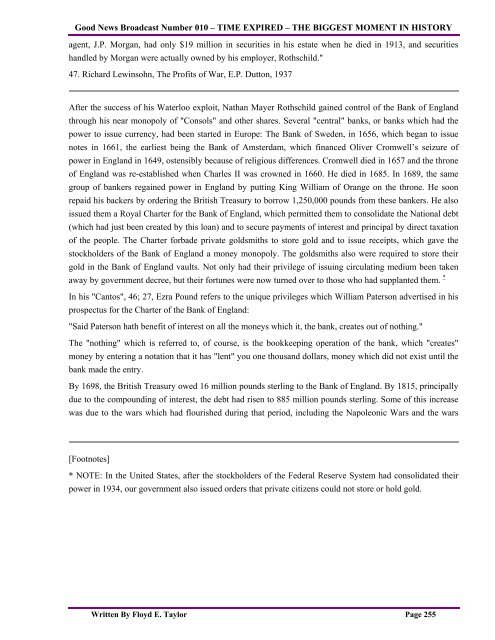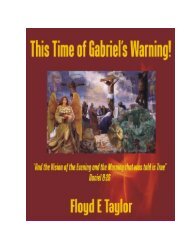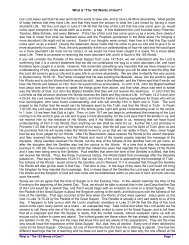TIME EXPIRED, The Biggest Moment in History - The Pure ...
TIME EXPIRED, The Biggest Moment in History - The Pure ...
TIME EXPIRED, The Biggest Moment in History - The Pure ...
Create successful ePaper yourself
Turn your PDF publications into a flip-book with our unique Google optimized e-Paper software.
Good News Broadcast Number 010 – <strong>TIME</strong> <strong>EXPIRED</strong> – THE BIGGEST MOMENT IN HISTORYagent, J.P. Morgan, had only $19 million <strong>in</strong> securities <strong>in</strong> his estate when he died <strong>in</strong> 1913, and securitieshandled by Morgan were actually owned by his employer, Rothschild."47. Richard Lew<strong>in</strong>sohn, <strong>The</strong> Profits of War, E.P. Dutton, 1937After the success of his Waterloo exploit, Nathan Mayer Rothschild ga<strong>in</strong>ed control of the Bank of Englandthrough his near monopoly of "Consols" and other shares. Several "central" banks, or banks which had thepower to issue currency, had been started <strong>in</strong> Europe: <strong>The</strong> Bank of Sweden, <strong>in</strong> 1656, which began to issuenotes <strong>in</strong> 1661, the earliest be<strong>in</strong>g the Bank of Amsterdam, which f<strong>in</strong>anced Oliver Cromwell’s seizure ofpower <strong>in</strong> England <strong>in</strong> 1649, ostensibly because of religious differences. Cromwell died <strong>in</strong> 1657 and the throneof England was re-established when Charles II was crowned <strong>in</strong> 1660. He died <strong>in</strong> 1685. In 1689, the samegroup of bankers rega<strong>in</strong>ed power <strong>in</strong> England by putt<strong>in</strong>g K<strong>in</strong>g William of Orange on the throne. He soonrepaid his backers by order<strong>in</strong>g the British Treasury to borrow 1,250,000 pounds from these bankers. He alsoissued them a Royal Charter for the Bank of England, which permitted them to consolidate the National debt(which had just been created by this loan) and to secure payments of <strong>in</strong>terest and pr<strong>in</strong>cipal by direct taxationof the people. <strong>The</strong> Charter forbade private goldsmiths to store gold and to issue receipts, which gave thestockholders of the Bank of England a money monopoly. <strong>The</strong> goldsmiths also were required to store theirgold <strong>in</strong> the Bank of England vaults. Not only had their privilege of issu<strong>in</strong>g circulat<strong>in</strong>g medium been takenaway by government decree, but their fortunes were now turned over to those who had supplanted them. *In his "Cantos", 46; 27, Ezra Pound refers to the unique privileges which William Paterson advertised <strong>in</strong> hisprospectus for the Charter of the Bank of England:"Said Paterson hath benefit of <strong>in</strong>terest on all the moneys which it, the bank, creates out of noth<strong>in</strong>g."<strong>The</strong> "noth<strong>in</strong>g" which is referred to, of course, is the bookkeep<strong>in</strong>g operation of the bank, which "creates"money by enter<strong>in</strong>g a notation that it has "lent" you one thousand dollars, money which did not exist until thebank made the entry.By 1698, the British Treasury owed 16 million pounds sterl<strong>in</strong>g to the Bank of England. By 1815, pr<strong>in</strong>cipallydue to the compound<strong>in</strong>g of <strong>in</strong>terest, the debt had risen to 885 million pounds sterl<strong>in</strong>g. Some of this <strong>in</strong>creasewas due to the wars which had flourished dur<strong>in</strong>g that period, <strong>in</strong>clud<strong>in</strong>g the Napoleonic Wars and the warswhich England had fought to reta<strong>in</strong> its American Colony.[Footnotes]* NOTE: In the United States, after the stockholders of the Federal Reserve System had consolidated theirpower <strong>in</strong> 1934, our government also issued orders that private citizens could not store or hold gold.Written By Floyd E. Taylor Page 255









